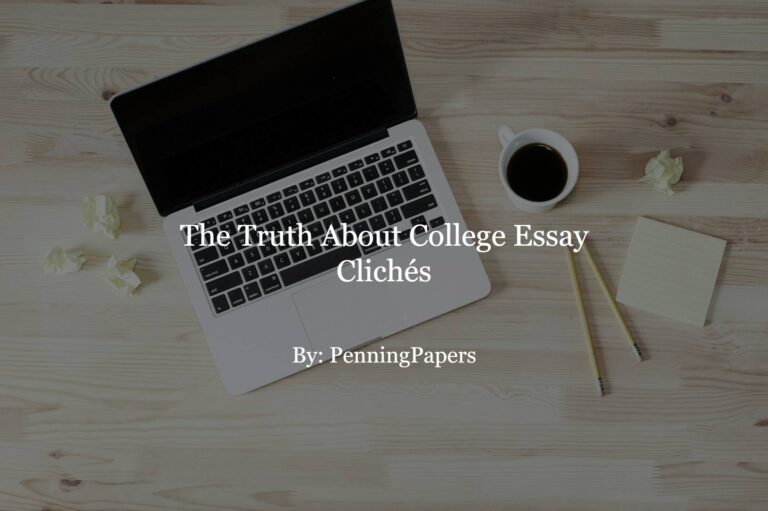Alright, I’ll say it now: everyone is wrong about college essay clichés.
For those who don’t know: the most college consultants, essay editors, and counselors recommend students to avoid clichés. “Just avoid it bro!” “Just be unique girl!”
While this may be correct on paper, this advice is at best altruistic and worst naively ignorant of the purpose of college essays.
How do I know?
Well, here’s some background info: I’m a college admissions consultant and essay editor. I’ve worked with students and helped them write “cliché essays” that got them into some of the best schools in the nation including recently Harvard, Yale, Cornell, Duke, Columbia, etc.
Okay, it gets a bit more complicated to explain why. So, I’ve separated this article into 4 sections. Why clichés can “sorta” be bad. Why everyone is at least somewhat cliché. The dangers of Main Character Syndrome. And, how to write your college essay without actually being cliché.
Table of Contents.
- Clichés are “Sorta” Bad.
- Everyone to Some Degree is Cliché.
- The Rise of Main Character Syndrome.
- How to Write a Unique College Essay Without Being Cliché.
Clichés are “Sorta” Bad.

Let’s get one thing clear.
Clichés can be somewhat bad. They don’t make your college essay stand out. And, they can get boring. Fair enough.
But, here’s the thing.
If you have clichés in your college essay, it’s not the end of the world.
In fact, there are plenty of successful college essays that have both cliché themes and cliché topics. Some of the best essays that I’ve seen have talked about everyday inconspicuous activities that could be considered cliché.
Now, there are some clichés that sound silly and some phrases that are overdone.
For instance, I highly recommend students avoid starting their essays with this format of sentence: “the [noun] [verb] as the [noun] [verb] [adverb ending in -ly]” An example of this format is: the ball flew into the air as the audience gasped shakily.
This format is overused by many in high school journalism, so much so that it’s easy to bring anyone’s eyes to tears. (not the good kind.)
So, some clichés can be bad. Avoid them. But, cliché topics and themes are so prevalent in college essays. And, just because they’re used doesn’t make the whole essay bad. It’s not always about having the most unique topic; rather, it’s more about your technique when writing.
Oh, and speaking of the prevalence of clichés, let’s talk about others. That is: everyone is cliché to a certain degree.
Everyone to Some Degree is Cliché.

Let’s be honest here for a second.
Most people applying to college aren’t skydiving neurosurgeons. Most people don’t live like they’re in movies. It’s not reality. In fact, most people live very normal and everyday lives. Some of the best students we’ve worked with enjoyed the simple pleasures in life themselves. They spent time with their families, played video games, traveled when it was possible, and liked to nerd out about new stuff they learned every once in a while.
Even when you take the most high-performing students, they’ll often have extracurriculars or hobbies shared by other people.
Model UN. Research. Sports. Orchestra. Yearbook or Journalism. Digital art. Small business.
The list goes on.
While it’s fine to recognize that clichés should sometimes be avoided, it’s the extreme aversion to clichés that causes problems. For, everyone to some degree shares commonalities with others. The need for absolute unique essays leads to disingenuous writing and forceful specialty.
Not a good look.
Nonetheless, you can still write about a cliché topic everyone has expereinced and still have a successful college essay. Here’s an example: the infamous Costco essay.
The Costco essay talks about… well, a student’s experience entering Costco.
Practically everyone has been to Costco. And, there are other clichés in there like the “thirst for knowledge.” But, let’s be real. This is a perfectly normal topic about a perfectly normal student. It’s an inside look into someone’s more personal life.
A lot of the criticisms surrounding the Costco essay was that it wasn’t unique. It wasn’t special. It wasn’t the groundbreaking Nobel Prize winner that everyone was thinking it would be. And… yeah. It wasn’t they’re right; but, that doesn’t mean you need to be a Nobel Prize winner to get accepted into a good school.
As we said before, the bizarre aversion to clichés incentivizes students to force themselves to be more unique than they really are. It shoehorns quirkiness where there isn’t any. And, this leads to This brings us to one of the most widely-spread misconceptions of college essays: the necessity of Main Character Syndrome.
The Rise of Main Character Syndrome.

Practically everyone is afraid of college essay clichés. They’re like the boogeyman. And, no one wants to be generic. This has lead to Main Character Syndrome.
To clarify, Main Character Syndrome is the the need to be unique to a pathological degree. It’s fear of any college essay clichés at all that leads to an overreaction where students force themselves to be the most unrealistically special people on the planet.
The Book Leo on YouTube covered a BookTok student-teacher romance novel that features this problem perfectly.
While everyone is special in their own way, Main Character Syndrome multiples this by 100. It forces students to exaggerate how unique and important they are. And, this can lead to a lot of disingenuous writing.
You might see some of your classmates doing this when they write their essays. They’ll exaggerate just how impressive and emotional the scene was; when, in reality, these things they talk about really weren’t the epic battles they portray them to be.
In the college essay review process, trust is key. Trust is worth more than gold. And, you can’t gain your admissions officer’s trust unless you’re being open and transparent about how you feel in your application essays. Exaggerating for effect is not going to do that.
After all, your readers weren’t born yesterday. They can see through these tricks. All forcing uniqueness will do is make your essay seem fake, disingenuous, and self-centered.
How to Write a Unique College Essay Without Being Cliché.

College essay clichés aren’t great; but, don’t force yourself to be too unique or quirky either. And, don’t be so generic that you avoid ingenuity. Balance is key.
This balance is required to ensure admissions officers trust you. They don’t want someone leaning too far on one side, lest they see the essay as “fake.”
In the next few sections, I’ll be covering how to write a balanced yet interesting essay. This helps you avoid writing a cliché college essay whilst also avoiding Main Character Syndrome.
1. Accept Your Best Topic Even if it’s Cliché.
The start of any good college essay is a good topic.
Now, here’s how you know which topic is best for you.
List down all the possible topics you can write about (whether they’re good or bad) and circle the ones that you’re the most emotionally attached to. So, ones that ignite a sense of pride, shame, determination, fear, etc are the ones you should circle.
The one that gives you the most emotional reaction is the one you go with.
Now, here’s where it gets interesting. You may actually notice that a good number of emotionally charged topics are often generic and cliché. Of course, there are a few exceptions like family deaths. But, in general, most of the impactful and emotionally charged topics are similarly shared with other peers.
For instance, the first time you started to learn how to appreciate school and therefore improve your grades is a common topic. Additionally, topics about winning sports games and immigrant stories are also cliché.
But, they’re cliché and overdone because people VALUE these topics. Why else would it be overdone?
Of course an immigrant story would be written by a lot of people! Those are impactful experiences that dramatically reshape the way students live their next few years. They’re cliché and overdone because students know those topics are emotionally close to their hearts!
Will a cliché topic put you at a disadvantage? Perhaps. But, if you had to choose between an emotionally powerful and impactful cliché topic or a unique and unimpactful topic, we recommend you choose the cliché one!
Again, it’s not always about the topic’s level of uniqueness. It’s also about how you write it. And, topics students find meaningful are often easier to write with depth and sophistication.
2. Stop Forcing Your Readers Into Thinking You’re Special.
This is a very, very important step to writing a college essay that is not cliché. In fact, it’s also part of making sure your admissions officers feel comfortable when reading about you.
You can’t force admissions officers to think you’re special. Period.
So, if you have any thoughts like…
- How do I make admissions officers think I’m smart?
- How do I make admissions officers feel like I’m a good person?
- How do I make admissions officers think I’m different from the rest of the admissions pool?
Get rid of them.
You can’t MAKE anyone think anything of you. Your admissions officers are smart enough to come to their own conclusions. Trying to control language and diction to manipulate or force admissions officers into thinking you’re special, smart, unique, etc is only going to isolate them from you.
When you let go of control, you can start to be more open, genuine, and honest about yourself during the application essay process. In fact, it’s this open honesty and transparency that lets you take the next step toward writing a truly unique essay that avoids being cliché.
3. Think Deeply About Simple Things.
Once you’ve settled on a strong college essay topic and you’ve let go of your sense of control, it’s time to start writing.
To write a college essay that’s not cliché, you don’t force unique topics or quirky moments. Remember: the goal is to be organic here. That’s how you gain trust. So, to truly be unique, you need to start thinking deeply about the simple things. That is, try to deeply analyze and extract meaningful themes from your essay topic, especially from the basic everyday details.
We’re borrowing this idea from the famous Eddie Woo, who talks about the idea of “thinking deeply about simple things.”
Let’s take an immigration essay topic as an example. College essays about immigration are quite common. So, it’s safe to say choosing to write about this can be a bit cliché. However, there are miniscule details pertaining to YOUR immigration story that will be different from what others have experienced.
Even if other people have immigrated to the United States, their experiences may vary widely from yours.
You need to deconstruct the small details in your experiences and expand on their thematic importance to truly write a solid essay that remains unique, even if you have a cliché topic.
4. Write a Sh*tty First Draft.
Alright, the next step is to write a horrible first draft.
There’s no way around it. Most of the students we’ve worked with who were afraid of being cliché were also deathly afraid of writing an imperfect draft their first time.
Don’t fall for the perfectionist trap. It’ll never be good enough during your first draft. Just write!
This is also part of letting go. You don’t just have to let go of the “perfectly unique essay” that you’ve conjured in your head. You also need to let go of the idea of a perfect college essay entirely. Don’t aim for perfection. Aim for done.
Perfection comes with editing over time. You’ll get there! But, you’ll never reach it unless you first accept imperfection and start with a sh*tty first draft.
5. Learn to Accept Cringe.
We wrote a separate article about this on our Reddit post which you can check out here.
Now, how does this relate to college essay clichés?
Part of the natural aversion to clichés in college essays is the need for perfection. Students are naturally inclined to be perfectionistic about their essays. And, this is born from an underlying anxiety of getting rejected from the colleges we worked so hard to get accepted into!
This actually makes it easy for our anxious mind to become “oversensitive.” That is, it sees things as generic even when it’s not. It raises false alarms when there’s no need to.
When you can learn to accept that anything you write can and will be cringey from the get go, you’ll have an easier time writing solid college essays. And, you’ll avoid any unnecessary clichés whilst still remaining unique and honest.
If you’re still concerned about whether your college essay is too cliché; or, you don’t know if you’re writing your essay well in general, fret not! We’ve helped countless students such as yourself through this process. Consider speaking with us via a free consultation. We’ll get back to you with free essay advising within 24 hours!

